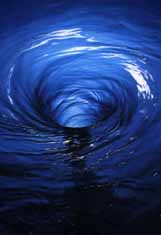Vortex
|
|
- This is an article on the real vortex phenomena. For information on the fictional aliens from the Ecco the Dolphin video game franchise, see Vortex life forms. For the VORTEx project, see the Versatile Ocean Subsea Robot for Technical Experiments
Airplane_vortex.jpg
A vortex is a spinning turbulent flow (or any spiral whirling motion) with closed streamlines. The shape of media or mass rotating rapidly around a center forms a vortex. It is a flow involving rotation about an axis (not always oriented vertically though; sometimes possessing a horizontal axis).
| Contents [hide] |
Dynamics
A vortex can be any circular or rotary flow that possesses vorticity.[1] Vorticity is a mathematical concept used in fluid dynamics. It can be related to the amount of "circulation" or "rotation" in a fluid. In fluid dynamics, vorticity is the circulation per unit area at a point in the flow field. It is a vector quantity, whose direction is (roughly speaking) along the axis of the swirl. Also in fluid dynamics, the movement of a fluid can be said to be vortical if the fluid moves around in a circle, or in a helix, or if it tends to spin around some axis. Such motion can also be called solenoidal. In the atmospheric sciences, vorticity is a property that characterizes large-scale rotation of air masses. Since the atmospheric circulation is nearly horizontal, the (3 dimensional) vorticity is nearly vertical, and it is common to use the vertical component as a scalar vorticity.
Observations
A vortex can be seen in the spiraling motion of air or liquid around a center of rotation. Circular current of water of conflicting tides form vortex shapes. Turbulent flow makes many vortices. A good example of a vortex is the atmospheric phenomenon of a whirlwind or a tornado. This whirling air mass mostly takes the form of a helix, column, or spiral. Tornadoes develop from severe thunderstorms, usually spawned from squall lines and supercell thunderstorms, though they sometimes happen as a result of a hurricane. See Polar vortex.
A mesovortex is on the scale of a few miles (smaller than a hurricane but larger than a tornado). [2] On a much smaller scale, a vortex is usually formed as water goes down a drain, as in a sink or a toilet. This occurs in water as the revolving mass forms a whirlpool. This whirlpool is caused by water flowing out of a small opening in the bottom of a basin or reservoir. This swirling flow structure within a region of fluid flow opens downward from the water surface.
- Video of two water vortex rings colliding (http://www.eng.nus.edu.sg/mpelimtt/collision.mpg) (MPEG)
Instances
- Lift-induced drag of a wing on an aircraft
- The primary cause of drag in the sail of a sloop
- Sunspot
- Tornado
- Whirlpool
- Dust Devil
See also
- Cyclonic separation
- Eddy
- Fan death
- Oregon Vortex
- Optical Vortex
- Viktor Schauberger
- Shower-curtain effect
- Spiral
- Strouhal number
- Von Kármán vortex street
- Vortex Healing
- Vortex ring
- Vortex tube
- Vortex cooler
- Vortex shedding
References and further reading
- "Weather Glossary (http://oap2.weather.com/glossary/v.html)"' The Weather Channel Interactive, Inc.. 2004.
- "Glossary and Abbreviations (http://www.bbsr.edu/rpi/meetpart/paper/glossary.html)". Risk Prediction Initiative. The Bermuda Biological Station for Research, Inc.. St. George's, Bermuda. 2004.
- Loper, David E., "An analysis of confined magnetohydrodynamic vortex flows". Case Institute of Technology. Washington, National Aeronautics and Space Administration]; for sale by the Clearinghouse for Federal Scientific and Technical Information, Springfield, Va. 1966. (NASA contractor report NASA CR-646) LCCN 67060315
External Links
- Dust Devil Movie (http://www.animalu.com/pics/dd1.htm) A short movie showing many spinning vortices of varying sizesde:Wirbel_(Strömungslehre)

